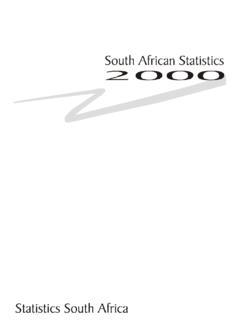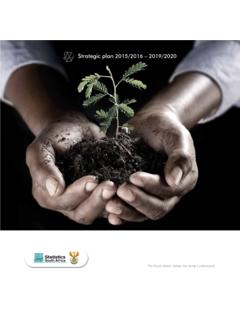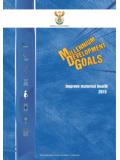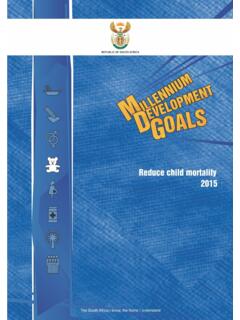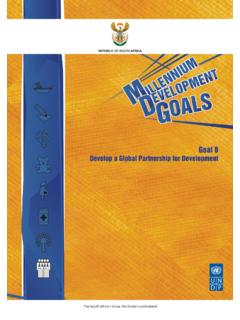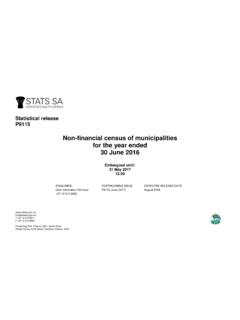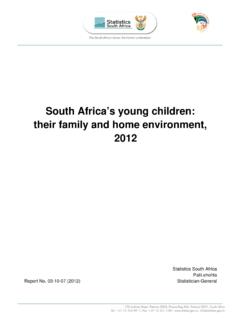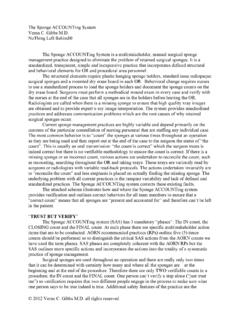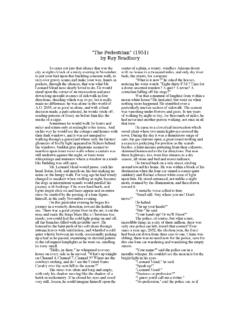Transcription of DATA Voices ACHIEVING THE SDGs - Statistics South Africa
1 South AFRICASTATS SATHE South Africa I KNOW, THE HOME I UNDERSTANDDATA VoicesVol. 217 January 2017Ms Teresa Clarke, the moderator of the session, said that when she spoke with her taxi driver about the World Data Forum, he requested that the forum look into the costs associated with data on the continent. This plea was echoed by the floor and the panel, who spoke to the importance of enabling all to become digital citizens. Affordable internet access is a prerequisite for the digital revolution that will enable the data 2030 offers a new lens through which to look at the world and the urgent challenges we are facing.
2 This new lens cannot change things by itself. The phrase Leave no-one behind is not simply a catchy slogan, but a commitment that signals a paradigm shift for the development agenda. Accurate, reliable, timely, disaggregated data is required to ensure that the needs of the The first-ever United Nations World Data Forum kicked off with a session aimed at laying the groundwork for, and looking at the specific objectives of, the conference. There were two high-level panels that addressed these and most vulnerable can no longer be hidden behind the average.
3 National statistical offices (NSOs) have to step up to the plate and become the central information hub for the Sustainable Development Goals (SDGs). While NSOs cannot be expected to produce all the data required, they should be at the forefront of coordination of the production of Statistics to monitor the SDGs. All communities represented at the forum have a crucial role to play in ensuring that the required data is produced in line with international standards and best question that always arises at meetings of this nature is, what happens after this?
4 How will the discussions that are held in here impact on the world out there? The Cape Town Global Action Plan for Sustainable Development Data is being launched at the United Nations World Data Forum. The Plan gives a vision with a global to-do list of what needs to be done to achieve it, and provides a blueprint for not only monitoring, but also ACHIEVING the Africa , Cape Town15 - 18 January 2017 ACHIEVING THE SDGs2 SDG data and statistical presentations often end with a slide that says, We need to build more capacity . This session sought to start with that premise: to unpack what it means, and who should be capacitated -- producers, users, donors or all of these groups?
5 The SDGs are a game changer in the field of data and Statistics . The need for statistical capacity development is highlighted in the SDGs, and Agenda 2030 has a chapter on follow-up and review. The early inclusion of statisticians in the development of the SDGs and the monitoring framework points to the increased awareness of the necessity for Statistics to inform and support the achievement of Agenda how can this massive need for data be met? And what type of capacity With the move to Agenda 2030, there are now 17 Sustainable Development Goals (SDGs), 169 targets and more than 200 indicators.
6 The SDGs need data that is more accurate, nuanced, innovative and collaborative. This places additional data burdens on under-resourced national statistical offices (NSOs), which ofttimes struggled to meet the data requirements for monitoring the Millennium Development is needed? The focus must be on the fundamental requirements, not necessarily on what is sexy or speedy or hot right now . Capacity retention and utilisation strategies need to be built into capacity building programmes to ensure that the capacity that is built does not simply walk out of the funding is always an issue, what came out strongly in the session is the need to build on what is currently there, and to utilise partnerships and relationships with other organisations that can, for example, conduct a peer review that would enable capacity building in a specific area.
7 There is always a need to do more with less, especially in the context of statistical production, which often falls low on a government s list of development needs to be defined; there has to be agreement on what needs to be done. Capacity development should align to national and international priorities, to ensure that what is learned can be applied to the everyday functioning of statistical producers, users and CAPACITY DEVELOPMENT3 Statistics can make an enormous difference to the quality of democracy. Innumeracy isthe enemy of democracy. People familiar withnumbers and factscan measure progressin their own lives and are empowered to speak aboutwhat remains to be done.
8 TREVOR A MANUEL, MINISTER OF FINANCE, AT THE FIFTIETH ANNIVERSARY CONFERENCE OF THE South AFRICAN Statistics ASSOCIATION (SASA), Ekhureleni, 5 November 2003 Ian Hacking argues, Quiet statisticians have changed our world, not bydiscovering new facts or technical developments, but by changing the ways that we reason, experiment and form our opinions .4In recent years, representatives from national statistical agencies have met informally to address selected problems in statistical methods, and some of these groups have become formally known as city groups . The Washington Group on Disability Statistics (WG) is one of these city groups, constituted to address the urgent need for cross-nationally comparable population-based measures of disability.
9 Its mandate is the promotion and co-ordination of international co-operation in the area of health Statistics , focusing on disability data collection tools suitable for censuses and national WG has developed a Short Set of Questions on Disability, which is suitable for use in censuses and surveys. Results from the WG Short Set differ markedly from a yes / no Are you disabled? question often asked in censuses. Countries are encouraged to include the WG Short Set of Questions on Disability in data collections that produce the sustainable development goal (SDG) indicators.
10 The WG is able to provide technical support to countries that are implementing work of the WG has ensured that persons with disabilities are strongly included in the 2030 Agenda, with Goal 17 placing particular emphasis on data being disaggregated by of Handicap International, Sightsavers, and the Leonard Cheshire Disability and Inclusive Development Centre at University College London gave presentations on projects undertaken Using Statistics to ensure that no one is left behindThere was a striking gap in the MDGs: persons with disabilities were not mentioned in any of the eight goals or the attendant 21 targets or 60 indicators, nor in the Millennium Declaration.
